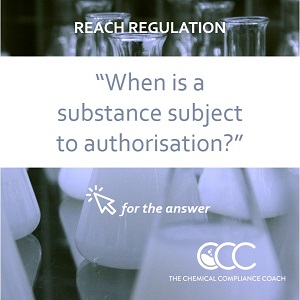When is a substance subject to authorisation?
A substance is subject to authorisation when it is included in the Authorisation List (REACH Annex XIV).
REACH stimulates the gradual substitution of Substances of Very High Concern (SVHCs) by less dangerous alternatives or technologies, where technically and economically feasible. To this end, ECHA frequently assesses the substances on the «Candidate List» to determine which ones should be subject to authorisation. Priority is typically given to substances produced at high volumes or with a wide dispersive use.
ECHA will publish an authorisation recommendation, which includes, among others:
- Specification of the use(s) for which authorisation must be granted
- Uses exempted from the authorisation requirement, if any.
- A “Sunset date” from which the use(s) (incl. placing on the market) of a substance is prohibited unless authorisation has been granted
- Latest application date for applications who wish to keep placing the substance on the market or using it after the sunset date
Anyone may react to this recommendation during a subsequent 90-day public consultation period. The final decision on the inclusion of the substance in the Authorisation List is taken by the European Commission.
Do you place on the market or use a substance that is included in the Authorisation List?
If you wish to (continue to) use or place on the market a substance included in the “Authorisation List” (REACH Annex XIV), you must apply for authorisation. This must be done before the substance’s sunset date or before starting your business activity. Application may be based on demonstrated adequate control or socio-economical analysis.
The preparation of the required Chemical Safety Report (CSR), Analysis of Alternatives (AoA) and Socio-Economical Analysis (SEA) requires a substantial amount of data and expertise. We can support you in developing your application strategy, notification of ECHA, preparation of the assessments and application submission.

